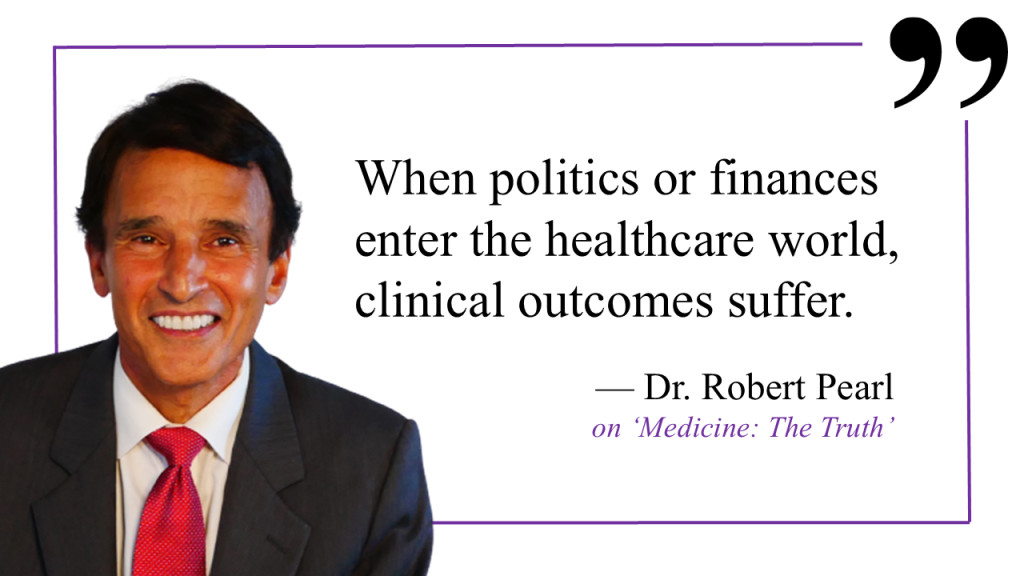Podcast: Play in new window | Download
Subscribe: Spotify | Email | RSS | More
In this episode of Medicine: The Truth, co-hosts Dr. Robert Pearl and Jeremy Corr examine a wide range of healthcare headlines. From the Supreme Court’s ruling on preventive care to heat-related deaths, experimental diabetes treatments and the continued unaffordability of life-saving drugs, this episode focuses on biggest stories in medicine today.
It opens with a breakdown of the Supreme Court’s recent 6–3 decision on pre-exposure prophylaxis (PrEP) for HIV. While the ruling preserves access to services recommended by the U.S. Preventive Services Task Force, Pearl warns that it introduces new risks.
“When politics or finances enter the healthcare world, clinical outcomes suffer,” says Pearl. He draws parallels to the ousting of experts on the CDC’s vaccine advisory panel and highlights the danger of eroding scientific independence.
Pearl then turns to a longstanding pain point in American healthcare: prior authorization.
While insurer companies claim this process guarantees safe, necessary care, studies show it often delays treatment or leads patients to abandon care altogether. Despite new promises from more than 50 insurers to streamline their processes by 2027, Pearl offers words of caution.
“Although this pledge sounds like a major commitment, clinicians remain doubtful Clinicians remain doubtful … And, of course, 2027 is two years away.”
Other key topics discussed in this episode include:
- Statin underuse: Research shows that prescribing statins to all eligible Americans could prevent 39,000 deaths and 165,000 major cardiac events annually, saving up to $25 billion a year.
- CT scan overuse: New data show that frequent surveillance scans for cancer recurrence do not improve survival and may lead to physical, psychological and financial harm.
- Cancer screening clarity: Only four cancers (breast, lung, cervical and colorectal) have strong evidence supporting screening. For the rest, benefits remain unproven or may be outweighed by risks.
- Colon cancer detection: FIT tests are as effective as colonoscopy in low-risk patients, especially those ages 40–49. Yet screening rates remain far too low.
- Heat-related health threats: Climate-driven “heat domes” pose rising risks to children, the elderly and patients with chronic disease.
- New HIV drug dilemma: The FDA approved an injectable PrEP option with a near-perfect success rate. However, at a staggering $28,000+ annual cost, it may remain out of reach for most.
- FDA under scrutiny: Accelerated approvals are allowing high-cost drugs to enter the market despite safety concerns. Pearl discusses the recent deaths of two children treated with a $3.2 million drug for Duchenne muscular dystrophy.
- Experimental type 1 diabetes cure: A new stem cell therapy enabled 10 out of 12 patients to stop insulin injections. But lifelong immunosuppression and likely high costs may limit uptake.
- Autism breakthrough: New genetic analysis identifies four distinct ASD subtypes, helping pave the way for earlier diagnosis and personalized support strategies.
- Alarming pediatric trends: Childhood obesity and mental health issues have risen sharply in the last 17 years. Climate change is also driving a spike in tick-related illnesses in children.
- Obesity science simplified: A global study confirms it’s not lack of exercise driving obesity—it’s excess calories, particularly from ultra-processed, high-fat foods.
The episode closes with a hard truth: U.S. healthcare spending is expected to exceed 20% of GDP by 2033. “Despite spending more, we’re not seeing improvements in outcomes,” Pearl says. He promises to revisit this issue in a future episode of Diving Deep.
* * *
Dr. Robert Pearl is the author of the new book “ChatGPT, MD: How AI-Empowered Patients & Doctors Can Take Back Control of American Medicine” about the impact of AI on the future of medicine. All profits from the book go to Doctors Without Borders.
Fixing Healthcare is a co-production of Dr. Robert Pearl and Jeremy Corr. Subscribe to the show via Apple, Spotify, Stitcher or wherever you find podcasts. Join the conversation or suggest a guest by following the show on Twitter and LinkedIn

